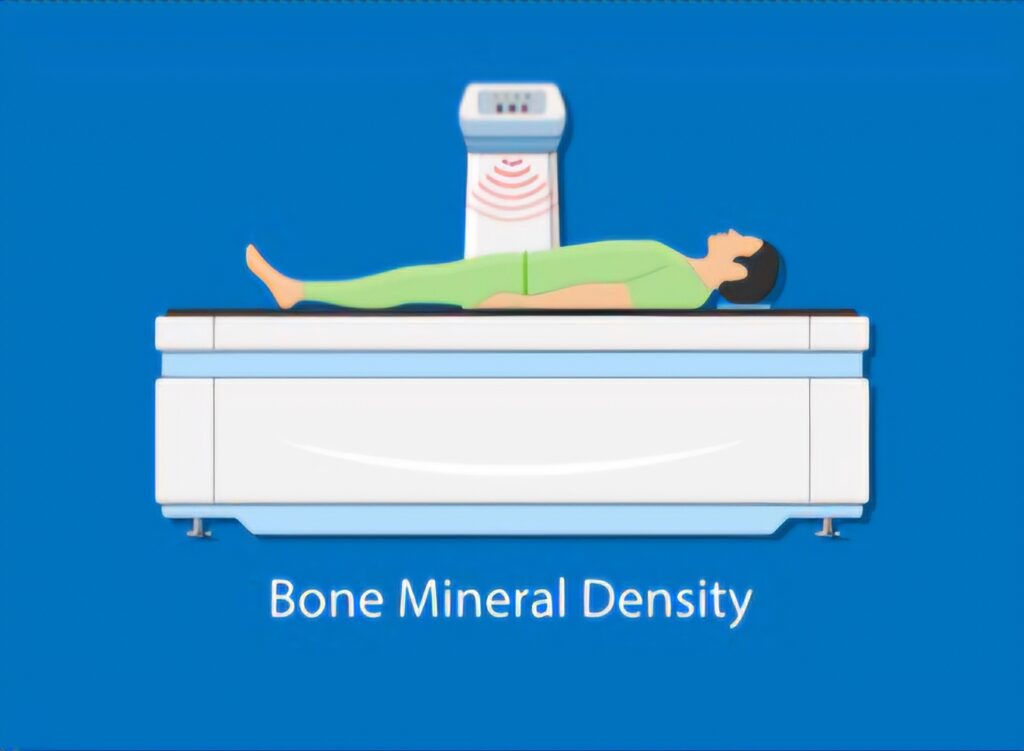
Reaching the age of fifty is a significant milestone in life. As you age, the body starts to show signs of wear and tear, and various health concerns begin to surface. While physical changes like stiffness, aches, and hair loss are common, there are also other underlying issues that could be quietly affecting your health. One of the major areas of concern as we age is bone health. As the bones age, they become more vulnerable to various conditions, and it’s crucial to take preventive measures. This is where a Bone Density Test (BMD) comes in which is also known as a bone test or bone mineral density test (BMD).
So what is this test? Well, a bone density test (BMD) is a medical procedure used to measure the strength of your bones. As we grow older, our bones can lose minerals and become weaker, which may increase the risk of fractures or other bone-related conditions like osteoporosis. The bone density test (BMD) helps assess whether your bones are becoming fragile or not. Essentially, it measures the amount of mineral content in your bones, which helps in determining their density. The test is typically performed using a special scanning machine, such as dual-energy X-ray absorptiometry (DXA), to provide a detailed measurement of bone strength.
For individuals over 40, the bone density test (BMD) becomes even more essential. As people age, the body’s ability to maintain bone mass diminishes, increasing the risk of fractures and bone diseases. A bone density test (BMD) can identify these changes before they cause significant harm, allowing for early intervention and management. The test is particularly recommended for women post-menopause and individuals with a family history of osteoporosis, as they are at higher risk.
Benefits of Bone Density Test (BMD)
The bone density test (BMD) offers several advantages, particularly for individuals over 40. Some of the key benefits of getting a bone density test (BMD) include:
Early Detection
The test can detect bone density loss before it leads to fractures or other severe conditions. Early detection allows for early treatment, which can slow down or prevent further bone loss.
Accurate Diagnosis
If you are experiencing pain or discomfort, a bone density test (BMD) can help doctors diagnose the cause accurately. The test can reveal if bone density loss is responsible for your symptoms. These will then also help in starting the treatment early.
Tailored Treatment Plans
Based on the results of the bone density test (BMD), doctors can create a personalized treatment plan. This may include lifestyle changes, dietary recommendations, or medications to help strengthen your bones.
Prevention of Osteoporosis
A bone density test (BMD) is crucial in preventing osteoporosis, a condition characterized by fragile bones that are prone to fractures. By identifying the risk early, you can take steps to prevent the condition from developing.
Peace of Mind
For many individuals, especially those with a family history of bone diseases, knowing the status of their bone density can provide peace of mind. The test allows you to understand your bone health and make informed decisions about your lifestyle and treatment options.
Where to Get the Test?
If you are considering a bone density test (BMD), there are several places where you can get it done. Leading healthcare centers and clinics across India offer this test. One such facility is the anti-aging centre, with branches in cities like Delhi, Gurgaon, and Pune. This clinic is equipped with advanced diagnostic tools to conduct bone mineral density test (BMD) and provide accurate results.
Apart from specialized clinics, endocrinologists — doctors who specialize in bone and hormone-related health issues — are another reliable source for obtaining a bone density test (BMD). Endocrinologists often use the test to assess bone health and help patients regain or maintain bone density. You can directly visit an endocrinologist’s office to get the test done.
However, in many cases, general physicians may not conduct the test themselves, but they can refer you to a clinic or a specialist who can perform the bone density test (BMD). It’s crucial to research and find reputable clinics and doctors who are equipped to conduct these tests and provide accurate results.
Conclusion
Bone health should never be ignored, especially after the age of fifty. A bone density test (BMD) is an essential tool to monitor and maintain bone health as you age. The test helps detect early signs of bone loss, prevent osteoporosis, and provides valuable insights into your overall bone strength. By investing in regular bone mineral density test (BMD), you can take proactive steps to prevent fractures and bone-related diseases, ensuring a better quality of life as you age. Whether through a specialized clinic like The Anti-Aging Centre or an endocrinologist, getting a bone test is a crucial step in maintaining your bone health. With the right treatment and lifestyle adjustments, you can protect your bones and enjoy life without the fear of debilitating fractures or pain. So, don’t wait—get your bone test asap and ensure your bones remain strong for years to come.
